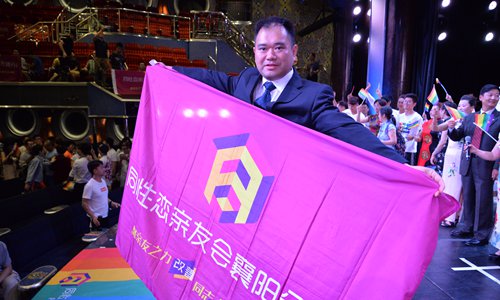HOME >> CHINA
LGBT community finds more sense of security with new legal provision
By Cao Siqi Source:Global Times Published: 2019/8/28 19:08:40

A bustling street Photo: VCG
Wang Yue has never forgotten the hopeless feeling he had on a summer night in 2016, when his boyfriend broke his legs and asked him to sign for him to undergo urgent surgery, only for the doctor to refuse him because he was just a "friend" and not a "family member."
Now, holding his "consensual custody" document, Wang can feel secure in the knowledge that in the future, somebody will have the legal right to take care of him when he grows old or becomes ill. More importantly, it is a promise to his boyfriend that he is his life partner "to a certain legal extent."
Chinese law stipulates that before performing surgeries, special examinations or special treatments, a medical institution must obtain the consent of the patient or the signature of one of his or her family members.
However, for the lesbian, gay, bisexual, and transgender (LGBT) group, who have seen great progress in terms of equal rights in recent years in China but for whom same-sex marriage is illegal, the regulation left many of them in a dilemma.
This shadow was finally lifted in 2017 when China revised its general provisions of civil law, allowing people above 18 years old with independent capacity to register a person as legal consensual custodian.
The LGBT community hailed it as an important move that will help protect the group's rights, solve living inconveniences and further reduce discrimination against them.
Time to act
When Wang, a 40-year-old state-owned company employee from Yichang, Central China's Hubei Province, joined an LGBT rights advocacy group in 2016, he received a slew of questions from the group members' parents: "Who will take care of my child when they grow old and who can sign for them in hospital?"
By chance, a lawyer had told him about the consensual custody document, which ensures that same-sex couples have the legal basis to exercise civil rights on behalf of the other party when a partner loses civil capacity. Notarization of guardianship in addition to property inheritance basically has the same legal effect as a marriage certificate, lawyers say.
"When my mother died in May 2018 of illness, I began to think I needed to find a guarantee for my future, and it was also time to give my boyfriend a 'formal' status," Wang told the Global Times.

Wang Yue participates in an activity promoting LGBT rights protection in Xiangyang, Hubei Province. Photo: Courtesy of Wang Yue
"If I get sick, he can sign for me. If I fall into a coma, he has the right to handle my property. The notarization not only solves inconveniences in our lives, but more importantly, it represents our mutual trust," he said.
With this in mind, they went to the city's notary office in June. The process turned out to be fairly straightforward. After answering questions on his willingness and being told about the legal responsibility and risks, Wang obtained the document three months later.
"I know I am not the first person in the country to have consensual custody as a same-sex partner, but I would like to be the first to speak about it. Many people feel that gay marriage is not possible for the future and as a result are in despair, but the consensual guardianship is a hopeful sign," Wang said.
Legal recognition
Consensual custody has previously been mentioned in laws on protecting senior citizens' rights. The new general provisions of civil law released in 2017 expand the target group from people above 60 years old to adults with full civil capacity. In the provisions, consensual custody generally refers to people who can designate a family member or other individual or organizations as their legal custodian.
The change has been widely regarded by gay couples as a form of legal recognition and prompted many in the group to ask about notarization, Peng Yanhui, founder of LGBT Rights Advocacy of China, told the Global Times on Tuesday.
In July, a notary in Nanjing, East China's Jiangsu Province published an article titled "Consensual custody builds bridge of love for LGBT group," which spread quickly on social media.
In August, a report published by sohu.com said the notary in Putuo district, Shanghai had issued notarizations for a dozen gay couples, citing a staff member.
On August 7 which marks Qixi festival, or Chinese Valentine's Day, Beijing Guoxin Notary Office published an article stating that the office had issued a notarization for a gay couple, the first of its kind in Beijing, even in North China.
Peng's organization has invited many notary employees to give seminars on consensual custody across the country.
Consensual custody is not marriage registration. The civil guardianship notarization for same-sex couples is a kind of right based on mutual trust and does not have the compulsory obligations, responsibility restrictions or penalties present in the marriage system, and can be removed through unilateral declaration, Peng said.
However, the rights obtained from consensual custody can solve many real life problems for people not in a legal marriage, Peng said.
Newspaper headline: Signing for custody
Posted in: IN-DEPTH,CHINA FOCUS